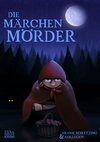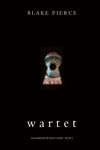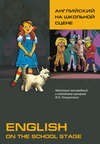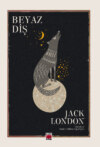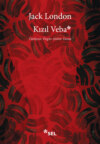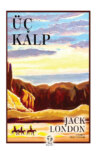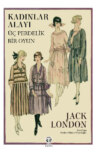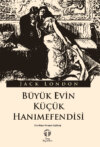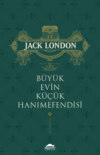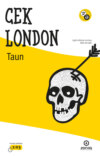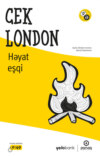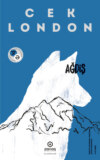Kitabı oku: «The God of His Fathers: Tales of the Klondyke», sayfa 8
“And never mind harness for the dogs,” he added, preparing to go. “I shall wait. But waste no time. The day chaseth the night alway, nor does it linger for man’s pleasure.”
Half an hour later, stamping his feet and swinging his arms by the sled, he saw her coming, a surly dog in either hand. At the approach of these his own animals waxed truculent, and he favored them with the butt of his whip till they quieted. He had approached the camp up the wind, and sound was the thing to be most feared in making his presence known.
“Put them into the sled,” he ordered when she had got the harness on the two dogs. “I want my leaders to the fore.”
But when she had done this, the displaced animals pitched upon the aliens. Though Hitchcock plunged among them with clubbed rifle, a riot of sound went up and across the sleeping camp.
“Now we shall have dogs, and in plenty,” he remarked grimly, slipping an axe from the sled lashings. “Do thou harness whichever I fling thee, and betweenwhiles protect the team.”
He stepped a space in advance and waited between two pines. The dogs of the camp were disturbing the night with their jangle, and he watched for their coming. A dark spot, growing rapidly, took form upon the dim white expanse of snow. It was a forerunner of the pack, leaping cleanly, and, after the wolf fashion, singing direction to its brothers. Hitchcock stood in the shadow. As it sprang past, he reached out, gripped its forelegs in mid-career, and sent it whirling earthward. Then he struck it a well-judged blow beneath the ear, and flung it to Sipsu. And while she clapped on the harness, he, with his axe, held the passage between the trees, till a shaggy flood of white teeth and glistening eyes surged and crested just beyond reach. Sipsu worked rapidly. When she had finished, he leaped forward, seized and stunned a second, and flung it to her. This he repeated thrice again, and when the sled team stood snarling in a string of ten, he called, “Enough!”
But at this instant a young buck, the forerunner of the tribe, and swift of limb, wading through the dogs and cuffing right and left, attempted the passage. The butt of Hitchcock’s rifle drove him to his knees, whence he toppled over sideways. The witch doctor, running lustily, saw the blow fall.
Hitchcock called to Sipsu to pull out. At her shrill “Chook!” the maddened brutes shot straight ahead, and the sled, bounding mightily, just missed unseating her. The powers were evidently angry with the witch doctor, for at this moment they plunged him upon the trail. The lead-dog fouled his snowshoes and tripped him up, and the nine succeeding dogs trod him under foot and the sled bumped over him. But he was quick to his feet, and the night might have turned out differently had not Sipsu struck backward with the long dog-whip and smitten him a blinding blow across the eyes. Hitchcock, hurrying to overtake her, collided against him as he swayed with pain in the middle of the trail. Thus it was, when this primitive theologian got back to the chief’s lodge, that his wisdom had been increased in so far as concerns the efficacy of the white man’s fist. So, when he orated then and there in the council, he was wroth against all white men.
* * * * *
“Tumble out, you loafers! Tumble out! Grub’ll be ready before you get into your footgear!”
Dave Wertz threw off the bearskin, sat up, and yawned.
Hawes stretched, discovered a lame muscle in his arm, and rubbed it sleepily. “Wonder where Hitchcock bunked last night?” he queried, reaching for his moccasins. They were stiff, and he walked gingerly in his socks to the fire to thaw them out. “It’s a blessing he’s gone,” he added, “though he was a mighty good worker.”
“Yep. Too masterful. That was his trouble. Too bad for Sipsu. Think he cared for her much?”
“Don’t think so. Just principle. That’s all. He thought it wasn’t right – and, of course, it wasn’t, – but that was no reason for us to interfere and get hustled over the divide before our time.”
“Principle is principle, and it’s good in its place, but it’s best left to home when you go to Alaska. Eh?” Wertz had joined his mate, and both were working pliability into their frozen moccasins. “Think we ought to have taken a hand?”
Sigmund shook his head. He was very busy. A scud of chocolate-colored foam was rising in the coffee-pot, and the bacon needed turning. Also, he was thinking about the girl with laughing eyes like summer seas, and he was humming softly.
His mates chuckled to each other and ceased talking. Though it was past seven, daybreak was still three hours distant. The aurora borealis had passed out of the sky, and the camp was an oasis of light in the midst of deep darkness. And in this light the forms of the three men were sharply defined. Emboldened by the silence, Sigmund raised his voice and opened the last stanza of the old song: -
“In a year, in a year, when the grapes are ripe – ”
Then the night was split with a rattling volley of rifle-shots. Hawes sighed, made an effort to straighten himself, and collapsed. Wertz went over on an elbow with drooping head. He choked a little, and a dark stream flowed from his mouth. And Sigmund, the Golden-Haired, his throat a-gurgle with the song, threw up his arms and pitched across the fire.
* * * * *
The witch doctor’s eyes were well blackened, and his temper none of the best; for he quarrelled with the chief over the possession of Wertz’s rifle, and took more than his share of the part-sack of beans. Also he appropriated the bearskin, and caused grumbling among the tribesmen. And finally, he tried to kill Sigmund’s dog, which the girl had given him, but the dog ran away, while he fell into the shaft and dislocated his shoulder on the bucket. When the camp was well looted they went back to their own lodges, and there was a great rejoicing among the women. Further, a band of moose strayed over the south divide and fell before the hunters, so the witch doctor attained yet greater honor, and the people whispered among themselves that he spoke in council with the gods.
But later, when all were gone, the shepherd dog crept back to the deserted camp, and all the night long and a day it wailed the dead. After that it disappeared, though the years were not many before the Indian hunters noted a change in the breed of timber wolves, and there were dashes of bright color and variegated markings such as no wolf bore before.
A DAUGHTER OF THE AURORA
“You – what you call – lazy mans, you lazy mans would desire me to haf for wife. It is not good. Nevaire, no, nevaire, will lazy mans my hoosband be.”
Thus Joy Molineau spoke her mind to Jack Harrington, even as she had spoken it, but more tritely and in his own tongue, to Louis Savoy the previous night.
“Listen, Joy – ”
“No, no; why moos’ I listen to lazy mans? It is vaire bad, you hang rount, make visitation to my cabin, and do nothing. How you get grub for the famine? Why haf not you the dust? Odder mans haf plentee.”
“But I work hard, Joy. Never a day am I not on trail or up creek. Even now have I just come off. My dogs are yet tired. Other men have luck and find plenty of gold; but I – I have no luck.”
“Ah! But when this mans with the wife which is Indian, this mans McCormack, when him discovaire the Klondike, you go not. Odder mans go; odder mans now rich.”
“You know I was prospecting over on the head-reaches of the Tanana,” Harrington protested, “and knew nothing of the Eldorado or Bonanza until it was too late.”
“That is deeferent; only you are – what you call way off.”
“What?”
“Way off. In the – yes – in the dark. It is nevaire too late. One vaire rich mine is there, on the creek which is Eldorado. The mans drive the stake and him go ’way. No odddr mans know what of him become. The mans, him which drive the stake, is nevaire no more. Sixty days no mans on that claim file the papaire. Then odder mans, plentee odder mans – what you call – jump that claim. Then they race, O so queek, like the wind, to file the papaire. Him be vaire rich. Him get grub for famine.”
Harrington hid the major portion of his interest.
“When’s the time up?” he asked. “What claim is it?”
“So I speak Louis Savoy last night,” she continued, ignoring him. “Him I think the winnaire.”
“Hang Louis Savoy!”
“So Louis Savoy speak in my cabin last night. Him say, ‘Joy, I am strong mans. I haf good dogs. I haf long wind. I will be winnaire. Then you will haf me for hoosband?’ And I say to him, I say – ”
“What’d you say?”
“I say, ‘If Louis Savoy is winnaire, then will he haf me for wife.’”
“And if he don’t win?”
“Then Louis Savoy, him will not be – what you call – the father of my children.”
“And if I win?”
“You winnaire? Ha! ha! Nevaire!”
Exasperating as it was, Joy Molineau’s laughter was pretty to hear. Harrington did not mind it. He had long since been broken in. Besides, he was no exception. She had forced all her lovers to suffer in kind. And very enticing she was just then, her lips parted, her color heightened by the sharp kiss of the frost, her eyes vibrant with the lure which is the greatest of all lures and which may be seen nowhere save in woman’s eyes. Her sled-dogs clustered about her in hirsute masses, and the leader, Wolf Fang, laid his long snout softly in her lap.
“If I do win?” Harrington pressed.
She looked from dog to lover and back again.
“What you say, Wolf Fang? If him strong mans and file the papaire, shall we his wife become? Eh? What you say?”
Wolf Fang picked up his ears and growled at Harrington.
“It is vaire cold,” she suddenly added with feminine irrelevance, rising to her feet and straightening out the team.
Her lover looked on stolidly. She had kept him guessing from the first time they met, and patience had been joined unto his virtues.
“Hi! Wolf Fang!” she cried, springing upon the sled as it leaped into sudden motion. “Ai! Ya! Mush-on!”
From the corner of his eye Harrington watched her swinging down the trail to Forty Mile. Where the road forked and crossed the river to Fort Cudahy, she halted the dogs and turned about.
“O Mistaire Lazy Mans!” she called back. “Wolf Fang, him say yes – if you winnaire!”
* * * * *
But somehow, as such things will, it leaked out, and all Forty Mile, which had hitherto speculated on Joy Molineau’s choice between her two latest lovers, now hazarded bets and guesses as to which would win in the forthcoming race. The camp divided itself into two factions, and every effort was put forth in order that their respective favorites might be the first in at the finish. There was a scramble for the best dogs the country could afford, for dogs, and good ones, were essential, above all, to success. And it meant much to the victor. Besides the possession of a wife, the like of which had yet to be created, it stood for a mine worth a million at least.
That fall, when news came down of McCormack’s discovery on Bonanza, all the Lower Country, Circle City and Forty Mile included, had stampeded up the Yukon, – at least all save those who, like Jack Harrington and Louis Savoy, were away prospecting in the west. Moose pastures and creeks were staked indiscriminately and promiscuously; and incidentally, one of the unlikeliest of creeks, Eldorado. Olaf Nelson laid claim to five hundred of its linear feet, duly posted his notice, and as duly disappeared. At that time the nearest recording office was in the police barracks at Fort Cudahy, just across the river from Forty Mile; but when it became bruited abroad that Eldorado Creek was a treasure-house, it was quickly discovered that Olaf Nelson had failed to make the down-Yukon trip to file upon his property. Men cast hungry eyes upon the ownerless claim, where they knew a thousand-thousand dollars waited but shovel and sluice-box. Yet they dared not touch it; for there was a law which permitted sixty days to lapse between the staking and the filing, during which time a claim was immune. The whole country knew of Olaf Nelson’s disappearance, and scores of men made preparation for the jumping and for the consequent race to Fort Cudahy.
But competition at Forty Mile was limited. With the camp devoting its energies to the equipping either of Jack Harrington or Louis Savoy, no man was unwise enough to enter the contest single-handed. It was a stretch of a hundred miles to the Recorder’s office, and it was planned that the two favorites should have four relays of dogs stationed along the trail. Naturally, the last relay was to be the crucial one, and for these twenty-five miles their respective partisans strove to obtain the strongest possible animals. So bitter did the factions wax, and so high did they bid, that dogs brought stiffer prices than ever before in the annals of the country. And, as it chanced, this scramble for dogs turned the public eye still more searchingly upon Joy Molineau. Not only was she the cause of it all, but she possessed the finest sled-dog from Chilkoot to Bering Sea. As wheel or leader, Wolf Fang had no equal. The man whose sled he led down the last stretch was bound to win. There could be no doubt of it. But the community had an innate sense of the fitness of things, and not once was Joy vexed by overtures for his use. And the factions drew consolation from the fact that if one man did not profit by him, neither should the other.
However, since man, in the individual or in the aggregate, has been so fashioned that he goes through life blissfully obtuse to the deeper subtleties of his womankind, so the men of Forty Mile failed to divine the inner deviltry of Joy Molineau. They confessed, afterward, that they had failed to appreciate this dark-eyed daughter of the aurora, whose father had traded furs in the country before ever they dreamed of invading it, and who had herself first opened eyes on the scintillant northern lights. Nay, accident of birth had not rendered her less the woman, nor had it limited her woman’s understanding of men. They knew she played with them, but they did not know the wisdom of her play, its deepness and its deftness. They failed to see more than the exposed card, so that to the very last Forty Mile was in a state of pleasant obfuscation, and it was not until she cast her final trump that it came to reckon up the score.
Early in the week the camp turned out to start Jack Harrington and Louis Savoy on their way. They had taken a shrewd margin of time, for it was their wish to arrive at Olaf Nelson’s claim some days previous to the expiration of its immunity, that they might rest themselves, and their dogs be fresh for the first relay. On the way up they found the men of Dawson already stationing spare dog teams along the trail, and it was manifest that little expense had been spared in view of the millions at stake.
A couple of days after the departure of their champions, Forty Mile began sending up their relays, – first to the seventy-five station, then to the fifty, and last to the twenty-five. The teams for the last stretch were magnificent, and so equally matched that the camp discussed their relative merits for a full hour at fifty below, before they were permitted to pull out. At the last moment Joy Molineau dashed in among them on her sled. She drew Lon McFane, who had charge of Harrington’s team, to one side, and hardly had the first words left her lips when it was noticed that his lower jaw dropped with a celerity and emphasis suggestive of great things. He unhitched Wolf Fang from her sled, put him at the head of Harrington’s team, and mushed the string of animals into the Yukon trail.
“Poor Louis Savoy!” men said; but Joy Molineau flashed her black eyes defiantly and drove back to her father’s cabin.
* * * * *
Midnight drew near on Olaf Nelson’s claim. A few hundred fur-clad men had preferred sixty below and the jumping, to the inducements of warm cabins and comfortable bunks. Several score of them had their notices prepared for posting and their dogs at hand. A bunch of Captain Constantine’s mounted police had been ordered on duty that fair play might rule. The command had gone forth that no man should place a stake till the last second of the day had ticked itself into the past. In the northland such commands are equal to Jehovah’s in the matter of potency; the dum-dum as rapid and effective as the thunderbolt. It was clear and cold. The aurora borealis painted palpitating color revels on the sky. Rosy waves of cold brilliancy swept across the zenith, while great coruscating bars of greenish white blotted out the stars, or a Titan’s hand reared mighty arches above the Pole. And at this mighty display the wolf-dogs howled as had their ancestors of old time.
A bearskin-coated policeman stepped prominently to the fore, watch in hand. Men hurried among the dogs, rousing them to their feet, untangling their traces, straightening them out. The entries came to the mark, firmly gripping stakes and notices. They had gone over the boundaries of the claim so often that they could now have done it blindfolded. The policeman raised his hand. Casting off their superfluous furs and blankets, and with a final cinching of belts, they came to attention.
“Time!”
Sixty pairs of hands unmitted; as many pairs of moccasins gripped hard upon the snow.
“Go!”
They shot across the wide expanse, round the four sides, sticking notices at every corner, and down the middle where the two centre stakes were to be planted. Then they sprang for the sleds on the frozen bed of the creek. An anarchy of sound and motion broke out. Sled collided with sled, and dog-team fastened upon dog-team with bristling manes and screaming fangs. The narrow creek was glutted with the struggling mass. Lashes and butts of dog-whips were distributed impartially among men and brutes. And to make it of greater moment, each participant had a bunch of comrades intent on breaking him out of jam. But one by one, and by sheer strength, the sleds crept out and shot from sight in the darkness of the overhanging banks.
Jack Harrington had anticipated this crush and waited by his sled until it untangled. Louis Savoy, aware of his rival’s greater wisdom in the matter of dog-driving, had followed his lead and also waited. The rout had passed beyond earshot when they took the trail, and it was not till they had travelled the ten miles or so down to Bonanza that they came upon it, speeding along in single file, but well bunched. There was little noise, and less chance of one passing another at that stage. The sleds, from runner to runner, measured sixteen inches, the trail eighteen; but the trail, packed down fully a foot by the traffic, was like a gutter. On either side spread the blanket of soft snow crystals. If a man turned into this in an endeavor to pass, his dogs would wallow perforce to their bellies and slow down to a snail’s pace. So the men lay close to their leaping sleds and waited. No alteration in position occurred down the fifteen miles of Bonanza and Klondike to Dawson, where the Yukon was encountered. Here the first relays waited. But here, intent to kill their first teams, if necessary, Harrington and Savoy had had their fresh teams placed a couple of miles beyond those of the others. In the confusion of changing sleds they passed full half the bunch. Perhaps thirty men were still leading them when they shot on to the broad breast of the Yukon. Here was the tug. When the river froze in the fall, a mile of open water had been left between two mighty jams. This had but recently crusted, the current being swift, and now it was as level, hard, and slippery as a dance floor. The instant they struck this glare ice Harrington came to his knees, holding precariously on with one hand, his whip singing fiercely among his dogs and fearsome abjurations hurtling about their ears. The teams spread out on the smooth surface, each straining to the uttermost. But few men in the North could lift their dogs as did Jack Harrington. At once he began to pull ahead, and Louis Savoy, taking the pace, hung on desperately, his leaders running even with the tail of his rival’s sled.
Midway on the glassy stretch their relays shot out from the bank. But Harrington did not slacken. Watching his chance when the new sled swung in close, he leaped across, shouting as he did so and jumping up the pace of his fresh dogs. The other driver fell off somehow. Savoy did likewise with his relay, and the abandoned teams, swerving to right and left, collided with the others and piled the ice with confusion. Harrington cut out the pace; Savoy hung on. As they neared the end of the glare ice, they swept abreast of the leading sled. When they shot into the narrow trail between the soft snowbanks, they led the race; and Dawson, watching by the light of the aurora, swore that it was neatly done.
When the frost grows lusty at sixty below, men cannot long remain without fire or excessive exercise, and live. So Harrington and Savoy now fell to the ancient custom of “ride and run.” Leaping from their sleds, tow-thongs in hand, they ran behind till the blood resumed its wonted channels and expelled the frost, then back to the sleds till the heat again ebbed away. Thus, riding and running, they covered the second and third relays. Several times, on smooth ice, Savoy spurted his dogs, and as often failed to gain past. Strung along for five miles in the rear, the remainder of the race strove to overtake them, but vainly, for to Louis Savoy alone was the glory given of keeping Jack Harrington’s killing pace.
As they swung into the seventy-five-mile station, Lon McFane dashed alongside; Wolf Fang in the lead caught Harrington’s eye, and he knew that the race was his. No team in the North could pass him on those last twenty-five miles. And when Savoy saw Wolf Fang heading his rival’s team, he knew that he was out of the running, and he cursed softly to himself, in the way woman is most frequently cursed. But he still clung to the other’s smoking trail, gambling on chance to the last. And as they churned along, the day breaking in the southeast, they marvelled in joy and sorrow at that which Joy Molineau had done.
* * * * *
Forty Mile had early crawled out of its sleeping furs and congregated near the edge of the trail. From this point it could view the up-Yukon course to its first bend several miles away. Here it could also see across the river to the finish at Fort Cudahy, where the Gold Recorder nervously awaited. Joy Molineau had taken her position several rods back from the trail, and under the circumstances, the rest of Forty Mile forbore interposing itself. So the space was clear between her and the slender line of the course. Fires had been built, and around these men wagered dust and dogs, the long odds on Wolf Fang.
“Here they come!” shrilled an Indian boy from the top of a pine.
Up the Yukon a black speck appeared against the snow, closely followed by a second. As these grew larger, more black specks manifested themselves, but at a goodly distance to the rear. Gradually they resolved themselves into dogs and sleds, and men lying flat upon them. “Wolf Fang leads,” a lieutenant of police whispered to Joy. She smiled her interest back.
“Ten to one on Harrington!” cried a Birch Creek King, dragging out his sack.
“The Queen, her pay you not mooch?” queried Joy.
The lieutenant shook his head.
“You have some dust, ah, how mooch?” she continued.
He exposed his sack. She gauged it with a rapid eye.
“Mebbe – say – two hundred, eh? Good. Now I give – what you call – the tip. Covaire the bet.” Joy smiled inscrutably. The lieutenant pondered. He glanced up the trail. The two men had risen to their knees and were lashing their dogs furiously, Harrington in the lead.
“Ten to one on Harrington!” bawled the Birch Creek King, flourishing his sack in the lieutenant’s face.
“Covaire the bet,” Joy prompted.
He obeyed, shrugging his shoulders in token that he yielded, not to the dictate of his reason, but to her charm. Joy nodded to reassure him.
All noise ceased. Men paused in the placing of bets.
Yawing and reeling and plunging, like luggers before the wind, the sleds swept wildly upon them. Though he still kept his leader up to the tail of Harrington’s sled, Louis Savoy’s face was without hope. Harrington’s mouth was set. He looked neither to the right nor to the left. His dogs were leaping in perfect rhythm, firm-footed, close to the trail, and Wolf Fang, head low and unseeing, whining softly, was leading his comrades magnificently.
Forty Mile stood breathless. Not a sound, save the roar of the runners and the voice of the whips.
Then the clear voice of Joy Molineau rose on the air. “Ai! Ya! Wolf Fang! Wolf Fang!”
Wolf Fang heard. He left the trail sharply, heading directly for his mistress. The team dashed after him, and the sled poised an instant on a single runner, then shot Harrington into the snow. Savoy was by like a flash. Harrington pulled to his feet and watched him skimming across the river to the Gold Recorder’s. He could not help hearing what was said.
“Ah, him do vaire well,” Joy Molineau was explaining to the lieutenant. “Him – what you call – set the pace. Yes, him set the pace vaire well.”


